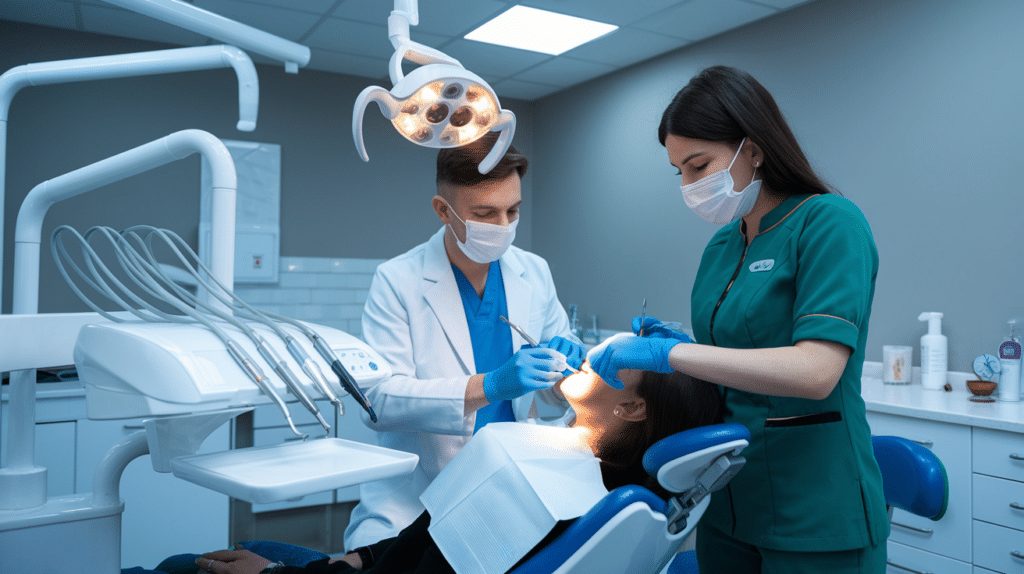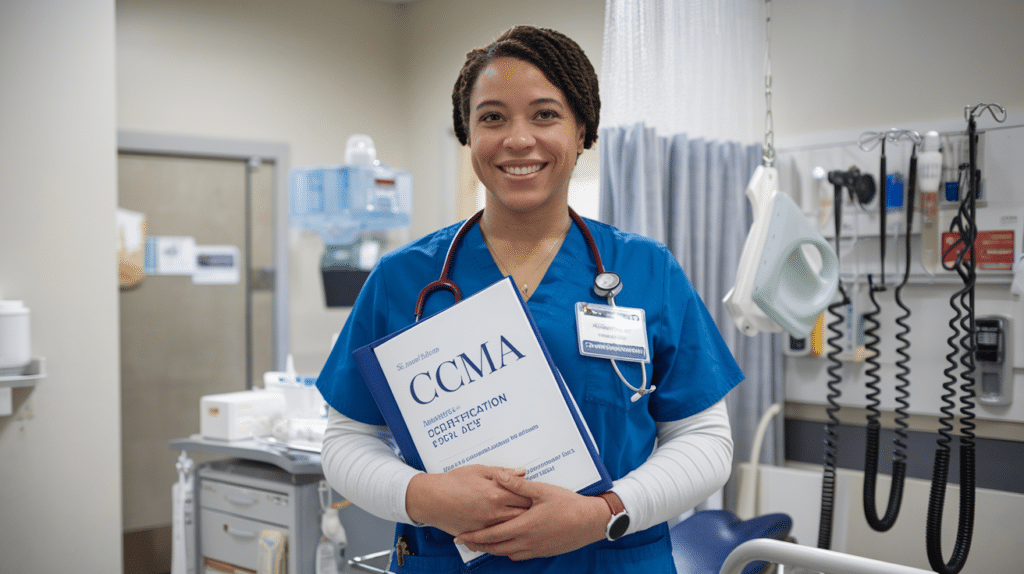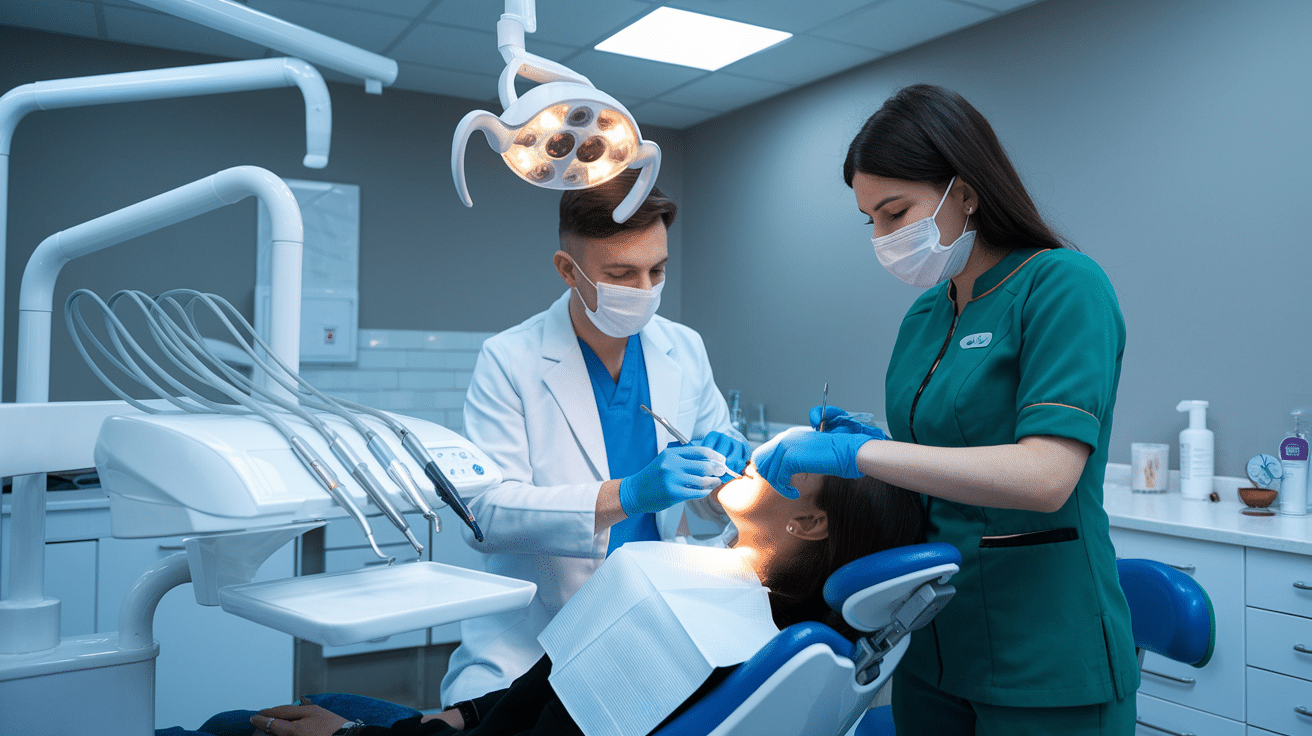If you’re considering a career in the healthcare field, two popular entry-level positions that offer distinct opportunities are medical assistants and dental assistants.
While both professions involve providing support to healthcare professionals and ensuring patients receive proper care, the nature of their work differs significantly.
So, in this article, we’ll discuss the key differences between the two rewarding careers. Understanding these differences can help you choose the path that best aligns with your interests and career goals.
Before that, we’ll discuss the dental assistant’s career, their duties, the skills that are necessary to carry out the responsibilities, their work environment, and so on.
Lastly, we’ll share a faster approach to help you become job-ready as a medical assistant or dental assistant without driving to college or without any student loan debt from the comfort of your home.
So, let’s get started.
What is a Dental Assistant?
A Dental Assistant is an integral member of the dental healthcare team who provides support to dentists during procedures, handles administrative tasks, and ensures the smooth running of the dental office.
They assist with both clinical and clerical responsibilities, such as preparing patients for treatments, sterilizing instruments, maintaining patient records, and ensuring patient comfort throughout their visit.
Dental assistants help streamline the workflow in dental practice by efficiently managing both hands-on care and office duties, allowing dentists to focus on patient care.

Job Duties of a Dental Assistant
Dental assistants play a versatile role in both the clinical and administrative aspects of a dental practice, ensuring that dental procedures run smoothly and efficiently.
Their responsibilities range from patient care and dental procedure support to office management tasks.
Here’s a breakdown of their core duties:
Assisting with Dental Procedures
One of the primary duties of a dental assistant is to assist the dentist during various dental procedures. This includes passing instruments, maintaining a clear view of the operative site using suction, and ensuring the patient is comfortable.
For example, during a cavity filling, the dental assistant will prepare the required tools, and hand instruments for the dentist and ensure the patient remains at ease throughout the process.
Preparing Patients for Treatment
Before a procedure begins, dental assistants help prepare patients. This might involve taking patient histories, explaining the procedure, and ensuring they are settled in the dental chair.
For instance, before a tooth extraction, the assistant will make sure the patient understands the process and is ready for treatment.
Sterilizing Instruments and Maintaining Infection Control
To maintain a safe and sterile environment, dental assistants are responsible for sterilizing dental instruments, ensuring that all tools used are free from contamination.
They follow strict protocols to clean and sterilize equipment between patients. For example, after a dental cleaning session, the assistant will sterilize the tools to prepare them for the next patient.
Taking and Developing X-rays
Dental assistants often handle radiographic tasks such as taking and developing dental X-rays. This requires knowledge of proper techniques and safety protocols to ensure accurate images and minimize radiation exposure. For instance, they may assist in capturing X-rays to identify issues like cavities or jaw misalignments.
Administrative Duties
Apart from clinical tasks, dental assistants also manage various administrative duties. This includes scheduling patient appointments, updating dental records, processing billing and insurance claims, and managing patient communication.
For example, they might coordinate follow-up appointments or answer patient queries over the phone.
Patient Education and Postoperative Care
Dental assistants provide patients with information regarding proper oral hygiene practices and postoperative care instructions.
After a procedure like a dental implant, the assistant will explain how to care for the area and may offer advice on maintaining good oral health.
Skills of a Dental Assistant
Dental assistants must possess a wide range of skills to perform their duties effectively and maintain a high standard of care for patients.
The role of a dental assistant requires a unique blend of technical proficiency, organizational ability, and interpersonal skills.
Here are the key skills of dental assistants:
Clinical Skills
A dental assistant needs to be well-versed in various clinical procedures to assist the dentist effectively. This includes understanding how to set up dental tools, handle instruments during procedures, and manage infection control protocols.
For instance, they must be adept at sterilizing equipment, handling suction devices, and preparing the patient for specific treatments, such as fillings or extractions.
Proficiency in taking dental X-rays is also crucial, ensuring that they follow safety protocols and capture accurate images.
Attention to Detail
Dental assistants work in a field where precision is key. Whether it’s ensuring that tools are properly sterilized, handling delicate materials, or capturing accurate patient information, attention to detail ensures the smooth operation of a dental practice.
For example, when assisting the dentist during a root canal, the dental assistant needs to follow the dentist’s instructions exactly to ensure the procedure is successful.
Communication Skills
Strong communication skills are vital in this role. Dental assistants interact with patients who may be anxious or uncomfortable, and it’s essential to explain procedures clearly and offer reassurance.
Additionally, they must relay information between patients and the dentist and assist with postoperative care instructions. Clear communication is also necessary when discussing appointments or billing with patients.
Organization and Time Management
Dental offices are fast-paced environments, and dental assistants need to manage their time effectively. They are responsible for ensuring that the dentist has all the necessary tools and materials for each procedure, keeping treatment rooms clean and prepared, and managing appointment schedules. Good organizational skills help in juggling these tasks efficiently without delays in patient care.
Technical Proficiency
Dental assistants must have technical skills, especially in handling dental tools, taking X-rays, and using office software.
With the increasing use of digital record-keeping, they should be comfortable navigating dental software programs for charting and updating patient files.
Their technical skills also extend to using machines to develop X-rays or operating suction devices during procedures.
Empathy and Compassion
Working with patients often means dealing with individuals who are nervous, in pain, or uncertain about their treatments.
Dental assistants must be empathetic and compassionate, offering patients reassurance, understanding their concerns, and making them feel comfortable during their visit. This emotional intelligence is essential for building trust with patients.
Administrative Competence
Besides clinical duties, dental assistants often handle front-office tasks. This includes managing patient records, billing, insurance claims, and appointment scheduling.
Having a good grasp of administrative skills ensures dental practice runs smoothly and efficiently, enabling better patient care.
Medical Assistant Vs Dental Assistant
If you want to start a career in healthcare then deciding between a Medical Assistant or a Dental Assistant career could be a tricky call to take.
To help you out with that, in this section, we will discuss the differences in their roles, which can help you make an informed decision.
Here are the key differences:
Scope of Practice
Medical Assistants have a broader scope of practice that involves both administrative and clinical tasks. They work in various healthcare settings like clinics, hospitals, and physician’s offices, assisting with patient exams, recording medical histories, performing lab tests, administering injections, and handling insurance billing.
Dental Assistants focus specifically on dental care, assisting dentists during procedures, maintaining patient records, sterilizing instruments, and preparing patients for oral exams. They also take X-rays, create dental impressions, and provide post-operative care instructions, concentrating entirely on oral health.
Education and Training
Becoming a medical assistant generally requires a post-secondary certificate or diploma from a medical assistant program, which can be completed in about 6 to 12 months. Many programs offer clinical training and externships to provide hands-on experience.
Similar to medical assistants, dental assistants also typically complete a one-year certificate or diploma program. In some states, dental assistants may need to pass an exam for certification, especially if they are performing advanced tasks like taking X-rays.
Certification
Although certification isn’t always required, becoming a Certified Medical Assistant (CCMA) can increase employability. This certification is earned through the National Healthcareer Association (NHA).
Certification for dental assistants depends on state regulations. In many cases, dental assistants need to earn a National Entry Level Dental Assistant Certification (NELDA) certification which is offered through the Dental Assisting National Board (DANB).
Job Duties
Medical Assistants perform a wide range of tasks, from administrative duties like scheduling appointments to clinical responsibilities such as drawing blood, administering medications, and assisting with minor surgeries.
Dental Assistants primarily assist dentists during dental procedures. They prepare and organize tools, help with dental surgeries, and provide patient care before and after treatments. Their duties are more procedure-focused, relating to oral health.
Work Environment
Medical Assistants work in diverse healthcare settings, including doctor’s offices, hospitals, outpatient clinics, and specialty medical practices. The variety of environments means more exposure to general healthcare.
Dental Assistants work in dental offices or clinics, primarily assisting in day-to-day dental procedures. They generally work standard office hours and are more specialized in their work environment compared to Medical Assistants.
Salary and Job Outlook
According to the U.S. Bureau of Labor Statistics (BLS), as of 2023, medical assistants earn an average annual salary of around $42,000.
The field is expected to grow by 15% between 2023 and 2033, reflecting strong demand for medical services across the country.
Dental assistants earn slightly higher on average, with salaries ranging around $46,540 annually.
The job growth for dental assistants is also promising, projected at 8% over the next decade, driven by the ongoing need for dental care.
So, ultimately, both medical assistants and dental assistants are vital to healthcare, but their career paths diverge in significant ways.
If you prefer a broader healthcare role with a mix of clinical and administrative duties, becoming a medical assistant might suit you.
However, if you are drawn to a more specialized role in oral health, dental assisting could be a better fit. Ultimately, your decision may depend on the type of healthcare environment you want to work in and the kind of patient care that interests you most.

Becoming a Medical Assistant in 4 Months
Pursuing a career as a Medical Assistant can be an incredibly fulfilling choice, especially if you’re passionate about healthcare and helping patients.
If you’re eager to become a Medical Assistant quickly, there’s a clear and structured pathway to follow.
Here’s how you can achieve this goal efficiently.
Step 1 -> Obtain a High School Diploma
The first essential step is completing high school or earning a GED. A solid foundation in subjects like biology, chemistry, and anatomy during high school can be very helpful in preparing you for the medical field.
Step 2 -> Enroll in a Medical Assistant Program
Enrolling in a medical assistant program is a critical step to gaining the necessary skills and knowledge. Formal education is the most reliable and quickest route to becoming a medical assistant.
However, choosing the right program is important for both your education and future job prospects. Community colleges and vocational schools offer traditional full-time programs, usually lasting 1-2 years.
Though thorough, these programs often require a large time commitment and can be expensive. Additionally, their rigid schedules might not be ideal for adults balancing other responsibilities.
That’s why online programs have become a popular alternative, offering flexibility, affordability, and a faster pace.
Preppy’s Self-Paced Medical Assistant Training Program stands out as an excellent option.
First, it provides a 100% online, self-paced learning environment. This means you can study at your own pace, whether you wish to complete the program in as little as six months or take your time. You won’t need to rearrange your schedule or commute to a physical campus, allowing you to fit your studies around your life.
The program also ensures quality education that meets industry standards so you can become ready for the CCMA exam by the NHA. This credential is highly sought after by employers and can significantly boost your career prospects and earning potential.
In addition to theoretical learning, Preppy offers an externship opportunity, giving you the opportunity to gain real-world experience in a healthcare setting close to you. This hands-on training is crucial for applying the skills you’ve learned.
Upon completion, you’ll receive a certificate from Auburn University, a well-respected, accredited, non-profit institution. Having a certificate from such a reputable source adds significant weight to your resume and can give you a competitive edge in the job market.
Another key advantage is the affordability of Preppy’s program. With a tuition of just $1,599, it’s much more budget-friendly compared to traditional options, helping you avoid the burden of student loans.
Plus, you could complete the training in as little as four months, potentially getting you job-ready faster than many other programs.
To top it off, Preppy offers round-the-clock support for any technical or course-related questions, and when you enroll, you’ll receive a free laptop to help with your studies, which is yours to keep even after completing the course.
So, if you’re looking for an affordable, and faster way to start your career as a medical assistant, Preppy’s Self-Paced Medical Assistant Training Program could be a great choice.
Step 3 -> Complete the Coursework
While enrolled in Preppy’s program, you’ll cover a wide range of topics from clinical skills to administrative tasks.
Courses include medical terminology, patient care, and medical office procedures, equipping you with the knowledge required to excel as a medical assistant.
Step 4 -> Gain Externship Experience
Hands-on experience is invaluable, and Preppy ensures students gain real-world experience through externship placements. Working in a clinical environment, you’ll get to apply your classroom knowledge under professional supervision, which will help prepare you for the job market.
Step 5 -> Prepare for Certification and get Certified
Once you’ve completed your coursework and externship, you could become eligible to take the Certified Clinical Medical Assistant (CCMA) exam, a certification highly valued by employers.
While certification may not be a legal requirement everywhere, most employers prefer certified candidates, making certification a crucial step toward expanding your job opportunities and earning potential.
Step 6 -> Apply for Medical Assistant Jobs
After obtaining certification, you can start your job search. Many medical assistants begin by working in smaller clinics or medical offices, which helps them build a broad experience that can later be transferred to larger healthcare facilities like hospitals.
So, by following these steps, and with the support of Preppy’s self-paced program, you could become a medical assistant in as little as four months. This accelerated path is ideal for those wanting to quickly transition into the healthcare field while maintaining flexibility.

Becoming a Dental Assistant with Preppy in 4 Months
A Dental Assistant is an integral member of the dental healthcare team who provides support to dentists during procedures, handles administrative tasks, and ensures the smooth running of the dental office.
So, if you want to start a rewarding career in healthcare without driving to medical school, and without student loan debt then becoming a Dental Assistant with Preppy can be an excellent option.
Here’s how you can become one:
Becoming a Dental Assistant in as little as 4 months is possible through Preppy’s self-paced online dental assistant program. The program is designed to provide flexibility for students, allowing them to progress quickly while balancing other life commitments.
Preppy’s program is ideal because it is fully online and self-paced, enabling students to finish the coursework faster than traditional programs.
Unlike full-time programs, which are often costly and time-consuming, Preppy’s approach makes Dental Assistant training both affordable, priced at $1599, and accessible, especially for adults balancing work or family responsibilities.
By enrolling in Preppy’s program, students not only gain essential dental assisting skills but also receive a certificate backed by Auburn University, a highly respected institution.
Additionally, the program includes an externship opportunity in your local area, which provides hands-on experience and could prepare you for NELDA certification (National Entry Level Dental Assistant).
The certification is essential for career advancement, as it qualifies you to work as a certified dental assistant which is offered through the Dental Assisting National Board (DANB).
As a bonus, Preppy also offers a free laptop if you enroll and pay in full, making it easier to complete your studies from anywhere.
This program offers a fast track to a rewarding career in healthcare, making it a smart choice for anyone looking to become a Dental Assistant quickly and efficiently.
In Conclusion
We hope this article could enlighten you about the key differences between these two rewarding healthcare careers.
Both careers are essential in healthcare, but they serve different functions and require specialized knowledge in distinct areas of medicine.
So, your decision may depend on your career goals, the type of healthcare environment you want to work in, and the kind of patient care that interests you most.
Lastly, if you’re looking for an affordable, and faster way to start your career as a medical assistant or dental assistant, then you could check out Preppy’s Self-Paced Training Programs.
Check it out Now!
Read More:
- Registered Medical Assistant
- Medical Assistant Job Description
- Medical Assistant Scope of Practice By State
Medical assistant





